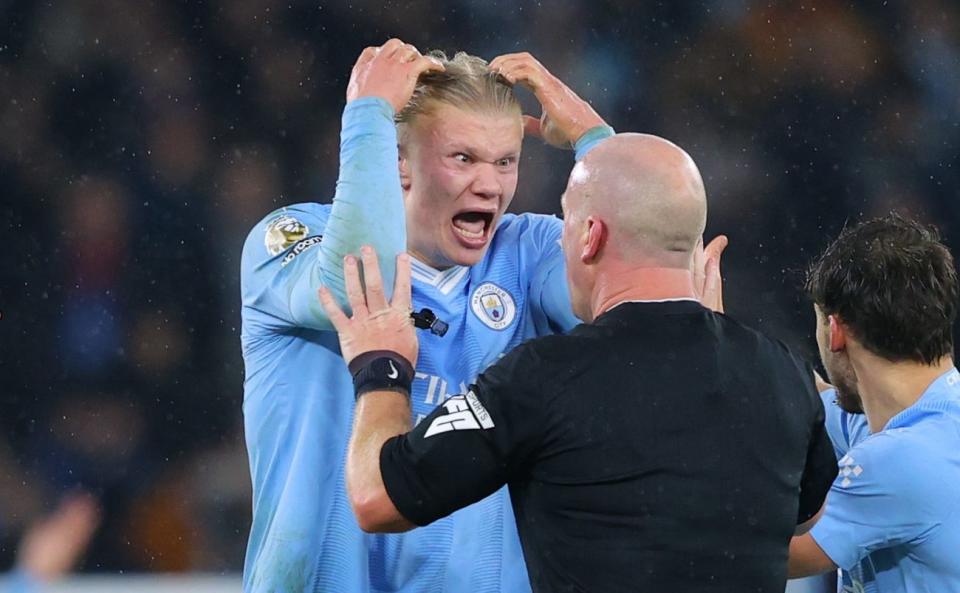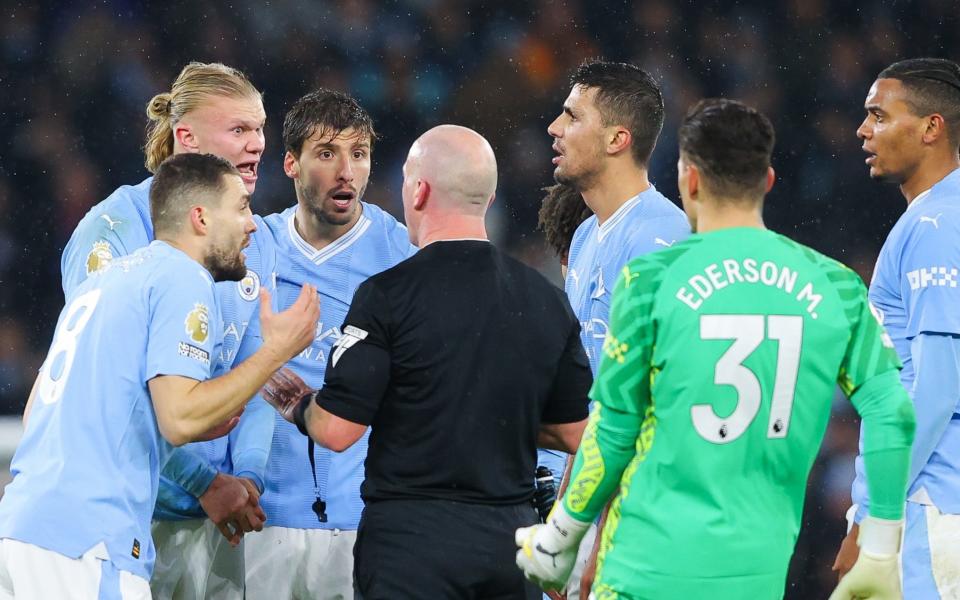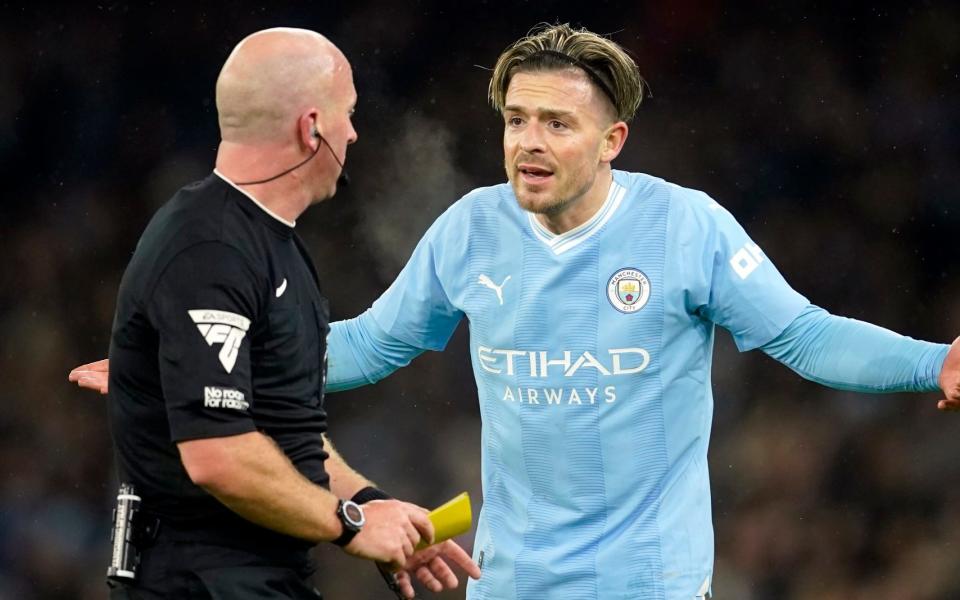Referee Simon Hooper ‘devastated’ over blunder that enraged Erling Haaland

Referees chief Howard Webb has revealed Simon Hooper was “devastated” and “remorseful” after the blunder that infuriated Manchester City in their draw with Tottenham earlier this month.
Hooper made a huge error blowing up for a foul when City were through on goal, with Erling Haaland leading the angry protests that led to a Football Association charge for failing to control players.
Webb admitted he understood City’s disappointment but stopped short of saying their reaction – screaming in the face of Hooper – was justified.

“For sure, he was devastated,” said Webb. “He’d refereed the game really well for 93 minutes, but he knows this is going to be the only talking point.
‘I said to him “just hold your hands up’”
“[It was] really close to the end of the game, I understand the disappointment that Manchester City felt on this one, because it would have been a wonderful advantage. He just formed the opinion to blow just at the wrong time. It looked like he was ready to play advantage.
“I said to him afterwards, ‘Just hold your hands up. It’s difficult to be annoyed at a remorseful man. Just show your disappointment in the moment’. Because he was certainly feeling that at the time.”
Speaking on the Match Officials: Mic’d Up show, Webb said Hooper made an outright error by blowing up for the foul and said it can be harder for officials to spot advantages at ground level.
“It is an officiating mistake and the Var has no part to play in this,” said Webb. “Of course, we’re always looking, as officials, to have that positive influence on the game, by trying to identify occasions when we can allow the game to play through an advantage. And Simon Hooper is normally good at identifying those things.
“On this particular occasion, he sees a pretty strong, reckless foul challenge by Emerson Royal on Haaland. It’s in midfield, and the ball comes backwards. He does the hard work, he just hesitates a moment to see if an advantage is possible. But he recognises in his mind, thinking it through, that it was a strong challenge, it was reckless, he is going to have to caution.
“At ground level, it’s not quite so easy to see the way that things are playing out as it is from an elevated view. And he decides to penalise just at the moment as the ball’s about to go, he blows the whistle, and then realises that a wonderful advantage was available.”

Pep Guardiola, the City manager, has previously said there was no apology from the referees for the error, and that City would pay the fine if the FA prove the charge of failing to control players. But he also questioned how his players should have reacted to such an error.
“I would like to know how the reaction should be when that last action happened,” he said. “How should the players not react? I’m sorry, we lost…we cannot talk, stay home and nothing happened. It’s a human instinct. Right now the players will not react in that way, but in that moment someone tell me.
“They want to fine [us], we’ll be fined. It’s fine. I promise you, all of us, if you are a football [player] and it happened, you would react in that way. It happened 20 years ago, 40 years ago, it will happen in 40 years. They didn’t apologise, we can’t apologise. But I don’t understand how it should be different. I understand my players completely.
“We took the learning from it and hopefully he will not do it again.”
Webb, however, also insisted Jared Gillett’s decision to rule out Arsenal’s late goal against Aston Villa was correct, despite only the merest flick on Kai Havertz’s arm.
“It’s not intentional, but it still has to be penalised. I think the idea was that if it comes off the arm, it can’t be a fair goal – that was the reason why this law came in,” added Webb, who also added that matches should be stopped immediately when Var intervenes to prevent the lengthy delays before a decision is made.
“I think a better way to do this would be to stop the game at that moment, as soon as the Vars recognise that a review is going to be needed for the penalty,” he said.
Referee John Brooks accused Anthony Martial of diving against Everton before the Var told him to review his decision. “He’s chucked himself,” said Brooks at the time before being told his decision was wrong.
Mic’d Up proves Var communication is getting better – but poor referees still hiding behind it
The latest Match Officials Mic’d Up programme on Sky Sports reviewing video assistant referee decisions demonstrated to me that there was an improvement in the communication process between Var and referee.
Conversation between referee and Var was delivered with more clarity and much less chaos that we had witnessed in the previous shows.
My concern centres around the decision-making accuracy in the first place. The examples shown around penalty-kick decisions left me wondering why the referees had made errors in their judgment in the first place.
Referees are clearly continuing to use the Var as a crutch rather than focusing on the need for them to improve the accuracy of their decisions, leading to a reduction of Var interventions.
Frankly, in the examples shown on penalty-kick decisions we need to highlight that Var intervened because they were errors made by the on-field referees.
What is the PGMOL doing about improving the accuracy of decision-making from its on-field officials?
The disallowed goal in the Arsenal game was reviewed and a very good explanation of the handball law was given by Howard Webb, where an attacking player cannot score a goal if it has come off the hand or arm of the goalscorer.
We were however looking at an incident where the referee made the correct call in the first place and a lot of time was taken up on the show to confirm that the referee had made the correct call.
I was disappointed that the entire show did not deal with any of the incidents surrounding red card offences.
Where was the discussion on Tottenham’s Cristian Romero and his excessive-force challenge that was not sanctioned with a red card against Newcastle United?
'I don't think he'll learn. I think it's in him. Some players you can't tame them. He's one of those'
The Super Sunday panel discuss Cristian Romero's yellow card 🟨 pic.twitter.com/x6opwq33gx— Sky Sports Premier League (@SkySportsPL) December 10, 2023
What about the incident in that same game when two players made head-to-head contact.
No, let’s take time to highlight that error by referee Hooper who applied advantage to Manchester City and with Grealish on a run through to goal, but then suddenly blew up and stopped the game.
What has this to do with Var? I feel that these were easier decisions to discuss rather than those that were more controversial.

 Yahoo Sports
Yahoo Sports 
